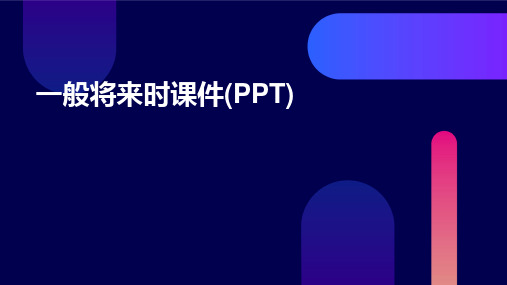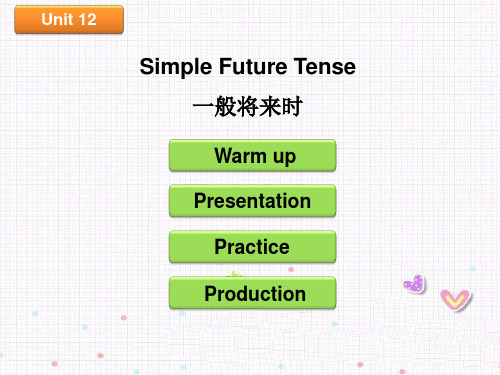小学一般将来时课件
一般将来时(精美课件)Will vs Be going to(共24张PPT )

谢谢
观看
A: Anna is in hospital. B: Yes, I know . I ____________ am going to visit her.
A: let's have a party!
B: That's a good idea! I will invite many friends
主观推测将来可能不发生根据现有情况推断区别22区别11作业写一篇用一般将来时的小作文内容不限字数不低于60词
Will vs Be going to
一般将来时
• 我们要了解:
be doing
does
• 我们要掌握:
be going to will
Will
vs
Be going to
?
PART 1
PART 2
• I will be 18 years old. • I'm going to be 18 years old. • I will be sick. • I'm going to be sick. • It will rain. • It is going to rain.
• I will be 18 years old. • I'm going to be 18 years old. • I will be sick. • I'm going to be sick. • It will rain. • It is going to rain.
A: Anna is in hospital. B: Yes, I know . I ____________ visit her.
区别1
• will:说话当时做决定(会,要)
一般将来时课件(PPT)

“be able to”表示将来有能力做某 事时,使用一般将来时形式,例如“I will be able to help you”。
情态动词如“can”、“may”、 “must”等,在一般将来时中通常直 接加动词原形,例如“I can swim”。
03
一般将来时在句子中的运用
陈述句中的使用
表示将要发生的动作或存在的状态
纠正方法
应使用正确的将来时形式,如 "He will go to the park tomorrow." 或 "He is going to the park tomorrow."
忽略动词变化规则
错误示例
They will play football in the future.(忽略了动词play在将来时中的变化)
纠正方法
在将来时中,应使用正确的助动词或情态动词形式,如 "I will be able to help you with your homework." 或 "I can help you with your homework."
错误示例
He will must finish his work before leaving.(错误地使 用了情态动词must)
作用
用于表示未来的计划、打算、预测、 假设等。
常见表达形式
will + 动词原形
表示将来的动作或状态,如“I will go to the park tomorrow.”(我明天将去公园。)
be going to + 动词原形
表示计划、打算或即将发生的动作,如“I am going to study hard this semester.”(我这 学期打算努力学习。)
一般将来时PPT课件

•一般将来时基本概念•一般将来时结构与用法•一般将来时时间状语及标志词•一般将来时与其他时态对比•一般将来时在各类从句中运用•一般将来时误区及注意事项•总结回顾与拓展延伸目录01一般将来时基本概念定义与特点定义特点表现形式will + 动词原形be going to + 动词原形现在进行时表示将来预测未来计划与安排条件与假设030201使用场景02一般将来时结构与用法主语+ be not going to + 动词原形+ 其他成分主语+ be to not (非标准用法,尽量避免使用) + 动词原形+ 其他成分主语+ will not (won't) + 动词原形+ 其他成分Will + 主语+ 动词原形+ 其他成分?Be + 主语+ going to + 动词原形+ 其他成分?Be + 主语+ to + 动词原形+其他成分?(较少使用,多用于书面语)特殊疑问词动词原形特殊疑问词going to +成分?特殊疑问词to +(较少使用,多用于书面语)注意:在一般将来时的使用中,要注意区分不同语境和表达方式的细微差别,选择合适的结构进行表达。
同时,也要注意与其他时态的区分和联系,避免混淆使用。
特殊疑问句结构03一般将来时时间状语及标志词常见时间状语表示将来的时间状语表示计划或安排的时间状语标志词识别与运用04一般将来时与其他时态对比与现在进行时对比时间指向不同01动词形式差异02使用情境不同03时间基准差异动词形式变化使用情境区别时间范围不同动词形式区别使用情境差异05一般将来时在各类从句中运用在宾语从句中运用01 02定语从句的时态取决于它所修饰的先行词,如果先行词是将来时态,定语从句也使用将来时态。
如果先行词是过去将来时,定语从句则使用过去将来时。
定语从句中表示将来的时间状语有:tomorrow, next year, in the future 等。
06一般将来时误区及注意事项误区二过度使用“will”和“going to”。
一般将来时课件ppt(共17张PPT)

Jim going to
afternoon?
in the playground tomorrow
4. .Jim is going to play football in the playground tomorrow afternoon.
Jim going to play football tomorrow afternoon?
2)在浊辅音和元音后读/d/.
一般过去时, 要用动词过去式. Jim is going to play football in the playground tomorrow afternoon.
Jim is going to play football in the playground tomorrow afternoon. ⑵are变为were。
there were many beautiful flowers there. 一般将来时表示将来某个时间要发生的动作或存在的状态常与表示将来的时间状语连用
⑴am ,is变为was。
So she They to read some books.
What did they do in the park? 1)在清辅音后读/t/ .
(3).动词过去式变化规则
a)一般情况下,直接加ed.如:wash--washed, look---looked; b)以不发音字母e结尾的,加d.如:like---
liked, dance---danced; c)以“辅音字母+y”结尾的,变y为i再加ed. 如:study---studied;
food and (play) lots of games. They
(come) home at 4:30.
一般将来时ppt课件

02 一般将来时的基本用法
表示将来要发生的行为
要点一
常见的助动词“will”和 “shall”可以用于表示将…
“I will go to the store tomorrow.”(我明天要去商店。 )
要点二
“be going to”也可以用于表达 将来要发生的行…
“It is going to rain later.”(待会儿要下雨了。)
肯定句
I am going to swim in the afternoon.
否定句
They are not going to watch the movie.
疑问句
Are you going to meet your friend tomorrow?
主语+be to+动词原形
肯定句
You are to hand in your homework tomorrow.
表示邀请或建议
总结词
表示邀请或建议某人做某事,通常用于 口语交流中。
VS
详细描述
在口语交流中,我们经常使用一般将来时 态来表示邀请或建议,例如:“Would you like to come to my house for dinner tomorrow?”(明天你想来我家 吃晚饭吗?)或者“Let's go for a walk after dinner.”(晚饭后我们去散步吧。 )
02
在一些情况下,我们也可以使用“be going to”来表达将来时
。例如
It is going to rain.(将要下雨了。)
03
构成
They are going to graduate next year.(他们将于明年毕业。)
一般将来时PPT课件

05
解析
含有will的句子改为否定句时 ,在will后加not,缩写为 won't。
06
THANKS
感谢观看
06
一般将来时练习题精选与解析
选择题精选与解析
01
题目:I _______ to the cinema. Will you go with me?
02
A. go B. am going C. have gone D. went
选择题精选与解析
答案:B
解析:由后一句“Will you go with me?”可知是打算去做某事,是一般将来时,所以用现 在进行时表将来,选B。
题目:— What _______ you _______ to do tomorrow?
选择题精选与解析
— I _______ visit my uncle. A. are; going; am going B. are; going; am going to
C. are; going to; am going D. are; going to; am going to
区别
现在进行时强调当前正在进行的动作 或状态,而一般将来时则强调未来将 要发生的动作或状态。
联系
两者都可用于表示将来的情况,但侧 重点不同。现在进行时通过现在正在 进行的动作暗示将来,而一般将来时 则直接表达将来的动作或状态。
与过去将来时的区别与联系
区别
过去将来时表示从过去某一时间 看将要发生的动作或状态,而一 般将来时则是从现在看将来要发 生的动作或状态。
表示将来经常发生的动作或习惯
常用的时间状语
always, often, usually等 。
句子结构
《一般将来时》课件

be going to+动词原形
结构
主语+be going to+动词原形+其他 成分
例子
We are going to meet at the train station at 5:00.(我们计划在5点钟 在火车站见面。)
含义
表示计划或安排将来要发生的动作或 状态
用现在进行时表示
结构
主语+be+动词现在分词+ 其他成分
一般将来时可以用来表示对未来事件的预见或推测,通常与时间状语连用,如“in the future”、 “next year”等。例如,“It will rain tomorrow.”(明天会下雨。)
表示意图、打算或希望
总结词
表示个人的意图、打算或意图、打算或希望,通常与 表示意图的动词连用,如“plan”、“intend”、“hope” 等。例如,“I will visit my grandparents next week.”( 我打算下周去看望我的祖父母。)
含义
表示将来某个时间正在进 行的动作或状态
例子
He is coming here next week.(他下周将会来这 里。)
用一般现在时表示
结构
主语+动词原形+其他成分
含义
表示将来某个时间经常发生的动作或状态
例子
I do my homework every day.(我每天都会做作业。)
03
一般将来时的肯定句、否定句和 疑问句
感谢观看
基本构成
will + 动词原形
疑问句形式
Will + 主语 + 动词原形
否定句形式
小学英语语法课件- 一般将来时 (共36张PPT) 全国通用

Presentation Sentences
She will take swimming lessons in this vacation. 她今年假期要去学游泳。 She is going to go shopping tomorrow. 她明天要去购物。 Jim will open a shop on internet. 吉姆打算要在网络上开个店。 Jim is going to be an actor when he grows up. Jim长大了想当一名演员。
___t_o_m_o_r_ro_w_.____________________________ 一般疑问句:A__re_t_h_e_c_h_il_d_re_n_g_o_i_ng__to__w_a_tc_h_a_d_o_l_p_h_in_s_h_o_w__
t_o_m_o_r_ro_w_?____________________________ There will be a great concert next week. 否定句:_T_h_e_r_e_w_il_l _n_o_t b_e__a_g_re_a_t_c_o_n_ce_r_t _n_ex_t_w_e_e_k_. ______ 一般疑问句:_W_i_ll_th_e_r_e_b_e_a_g_r_e_a_t _co_n_c_e_rt_n_e_x_t_w_e_e_k?______
Practice Oral Practice
小组合作完成单项选择,并朗读句子
( C ) There __________ a meeting tomorrow afternoon.
A. will be going to
B. will going to be
C. is going to be
- 1、下载文档前请自行甄别文档内容的完整性,平台不提供额外的编辑、内容补充、找答案等附加服务。
- 2、"仅部分预览"的文档,不可在线预览部分如存在完整性等问题,可反馈申请退款(可完整预览的文档不适用该条件!)。
- 3、如文档侵犯您的权益,请联系客服反馈,我们会尽快为您处理(人工客服工作时间:9:00-18:30)。
小学一般将来时课件
小学一般将来时课件
小学一般将来时课件怎么设计?以下是小编整理的相关范文,欢迎阅读。
Teaching aims:
Grasp the important points 2.Important points:
一般将来时的用法 (There be) 3. Teaching steps: Task1:一般将来时
1)概念:表示将要发生的动作或存在的状态及打算、计划或准备做某事。
2)构成 S + will+动词原形 +其它
am/is/are +going to +动词原形 +其它
3)标志词tomorrow, next day(week, month, year…),soon, the day after tomorrow(后天), in a few days, in+一段时
间等。
4)句式变换
肯定句主语 + will+动词原形+ 其它主语+ am/is/are+going to +动词原形 +其它否定句
主语 + w on’t+动词原形+ 其它; 主语+ am/is/are+ not +going to +动词原形 +其它
疑问句及答语Will+主语+ 动词原形+其它? Am/is/are +主语+ going to +动词原形 +其它
Yes, 主语+will. No, 主语+ won’t
Yes, 主语+ am/is/are. No, 主语+ am/is/are +not. 5)注意
①be+ doing表示将来(用现在进行时表示将来)
常用这种结构的`动词有go, come, leave, stay, start, begin, fly 等 Eg: They (fly) to Wuhan tomorrow. you (leave) tonight?
②“be about to+ 动词原形”,“be to+动词原形”结构表示即将发生的动作
③ 在 if,as soon as, until,when引导的状语从句,主句用一般将
来时,从句用一般现在时代替一般将来时。
Eg:We (have) a football match if it (not rain) tomorrow. ④ There be结构的一般将来时There be(is/are) +going to + 动词原形+其它 There will+be+其它
Eg: 1. There (be) a heavy rain the day after tpmorrow. (有两种填法)
2. There (be not) any paper money in the future.
3. 明天有雨吗? rain tomorrow?
4. 一百年后会有更多的楼房。
There
buildings in 100 years.
当堂训练
1. There __________ a meeting tomorrow afternoon.
A. will be going to
B. will going to be
C. is going to be
D. will go to be 2. Charlie ________ here next month.
A. isn’t working
B. doesn’t working
C. isn’t going to working
D. won’t work
3. He ________ very busy this week, he ________ free next week.
A. will be; is
B. is; is
C. will be; will be
D. is; will be 4. There _____ a dolphin show in the zoo tomorrow evening.
A. was
B. is going to have
C. will have
D. is going to be 5. –_______ you ________ free tomorrow? – No. I ________ free the day after tomorrow. A. Are; going to; will B. Are; going to be; will C. Are; going to; will be D. Are; going to be; will be 6. Mother ________ me a nice present on my next birthday. A. will gives B. will give C. gives D. give
7. I ______(leave)in a minute. I ______(finish)all my work before I ______ (leave). 8. How long _____ you _____(study)in our country? 9.I _____(hope)to visit the other parts of your country.
10. Mary’s birthday is next Monday, her mother _____(give)
her a present. 11.I was about (leave) when the phone rang. 12. We (go) there tomorrow. 改写句子
13. People in the north often go skating in winter. (next winter)
14. There are two cinemas in that town. (next year)
15. He comes back late.(in two days)
16. She is a conductor of a train.(soon)。
